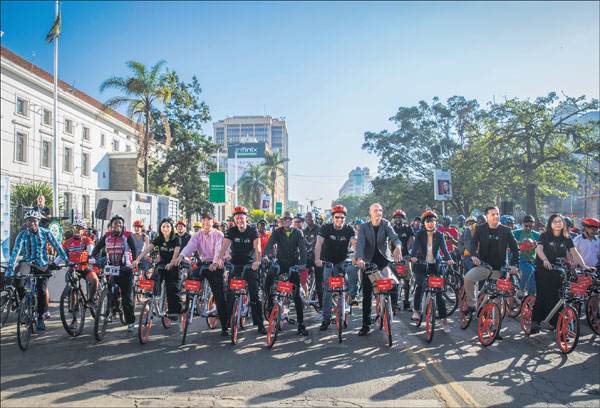Pedaling toward a cleaner world

Mobike gives Africa a glimpse of its sharing concept, shipping in 100 bicycles from China for anti-pollution ride in Nairobi, Kenya
Mobike Technology, the world's largest bike-sharing company, rolled its "zero-pollution" concept into Africa with of a 3.5 kilometer bike ride in Nairobi, the capital of Kenya, last weekend.
More than 200 riders took part in the ride through central Nairobi early on Dec 3, a day before the opening of the 3rd United Nations Environment Assembly.

Erik Solheim, executive director of the United Nations Environment Programme; Liu Xianfa, China's ambassador to Kenya and Hu Weiwei, founder and president of Mobike, took part in the ride, which was aimed at promoting the fight against pollution.
Mobike shipped 100 bikes from China for the event, which was joined by more than 100 other riders. The Mobike bicycles were then made available for the participants from 193 countries who were in Nairobi for the assembly, held at UN headquarters from Dec 3 to 6. After the assembly, the bikes were donated to the UN to be used on the campus of its Nairobi headquarters to serve staff and visitors.
"Mobike provides an intelligent, low-carbon and swift means of transport which is changing our cities," says Solheim. "We hope that, through the collaboration with Mobike, we will bring the concept of green travel and environment to more countries and cities."
Air pollution is a massive problem worldwide, claiming an estimated 6.5 million lives each year according to a World Health Organization report. Bike sharing is a crucial alternative to motorized transportation, and bike-sharing companies are leading the way in cutting out journeys that contribute to air pollution and climate change.
Statistics from Mobike indicate that, to date, it has provided 8 million bikes across the world, serving more than 200 cities in 12 countries.
"This is the first time that Mobike has launched its operation in Africa, thanks to the recognition of and support for the company's concept by the United Nations Environment Programme," says Hu, Mobike's president.
Mobike is dedicated to science, technological and commercial innovation, Hu says. It endeavors to use its bikes in cities to ease traffic congestion and air pollution.
"Yet the realization of these goals needs the interaction of people from all walks of life throughout the world," she says. "Mobike is willing to cooperate closely with national and city governments to jointly create a series of sustainable urban ecotransportation plans and drive the sustainable development of the green economy.
"I am extremely happy to ride a Mobike bike in Nairobi, a city known as the capital of world environment, where bicycles have been absent for a long time," says Liu. "This is a concrete move that shows Chinese companies support the call of the United Nations Environment Programme."
According to figures given by the company, Mobike users have cycled more than 18.2 billion km, preventing 4.4 million tons of carbon dioxide emissions, equivalent to taking 1.24 million cars off the road for a year.
Sirjabir Abba and Rinkesh Patel are two mountain bike riders who regularly ride at weekends. They learned about the Nairobi event from Facebook and were eager to participate.
"The event is a physical part of the fight against pollution. With bikes, we are going green, consuming less fuel and producing less smoke," says Patel. "More people should start cycling."
panzhongming@chinadaily.com.cn

































